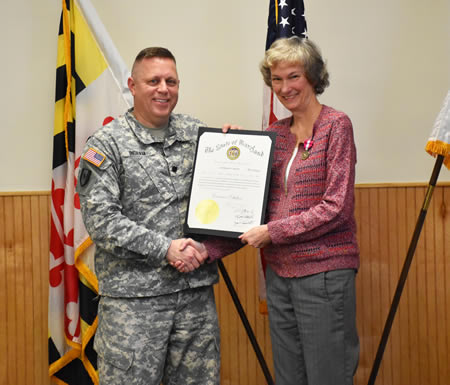USAMMDA's Wivell Retires after 28 years

A successful organization is only as good as its people. This is especially true, when you can find those rare employees that make the long term commitment to one organization. These rare individuals are a part of more than just the history of the organization; they are a part of its successes, reputation, growth and future progress. Stephanie Wivell committed 28 years of federal government service to the U.S. Army Medical Materiel Development Activity.
Wivell began her federal government career in February 1988 as a term employee at the health clinic, located within the U.S. Army Medical Research of Infectious Diseases. When term employees were being eliminated at the end of fiscal year 1988, Wivell was selected by USAMMDA, without being interviewed, to perform general administrative duties, still as a term employee. At the time, there were less than 35 staff members at USAMMDA.
"To become a permanent civilian, I took a job with the Navy. I found that the Navy did everything differently. I could not wait to get back to work with the Army," said Wivell. "So, when the opportunity to come back to USAMMDA arose in August 1989, I took it and have been working here ever since."
Wivell evolved into the Logistics Management Specialist at USAMMDA. Her duties included making decisions for the organization regarding safety, equipment, making purchases and solving space issues. For USAMMDA, this included several major moves and personnel growth.
"To successfully relocate four divisions from Building 622 and the Division of Regulated Activities and Compliance Division from their trailer beside USAMRIID, into building 1430 in May 2006 was a large undertaking, orchestrated by our then-Deputy Commander Rosemarie Kirzner & myself," explained Wivell. "Eventually, we moved the Medical Support Systems Project Management Office from their suites at the new barracks and Force Health Protection Division from building 1054, at the request of our then Commander, Col. Brian Lukey."
For the past 21 years, Wivell has been the primary credit card holder for USAMMDA, and she has admitted that "purchasing has been my favorite part of the job."
Wivell admitted that an early challenge coming into the USAMMDA was learning the military ranks.
"Also, learning the multiple acronyms and Army-unique words was a challenge. In addition, having to learn all the 'new' computer systems, right after I became skilled at using all the 'old' computer systems tested my patience."
Over her 28 year career, Wivell has watched first hand as USAMMDA grew from that 35 employee organization in 1988, to more than 200 personnel today. Her professional contributions can be seen in every office, in the new conference room, the anti-skid floor mats on the stairs and much more.
As most retirees look forward to, Wivell is no exception that her first plan is to not have to set an alarm clock for work anymore. As for the rest of her retirement plans, Wivell explained, "We have eight grandchildren that will occupy a lot of our time. We also plan on travelling across the United States to see all of those sites that were pictured in our geography books we used in elementary school."
The first trip is already planned for Sarasota, Florida, to watch the Baltimore Orioles in spring training.
After a long and successful career supporting the USAMMDA, the Army and the federal government, Wivell will be missed.













